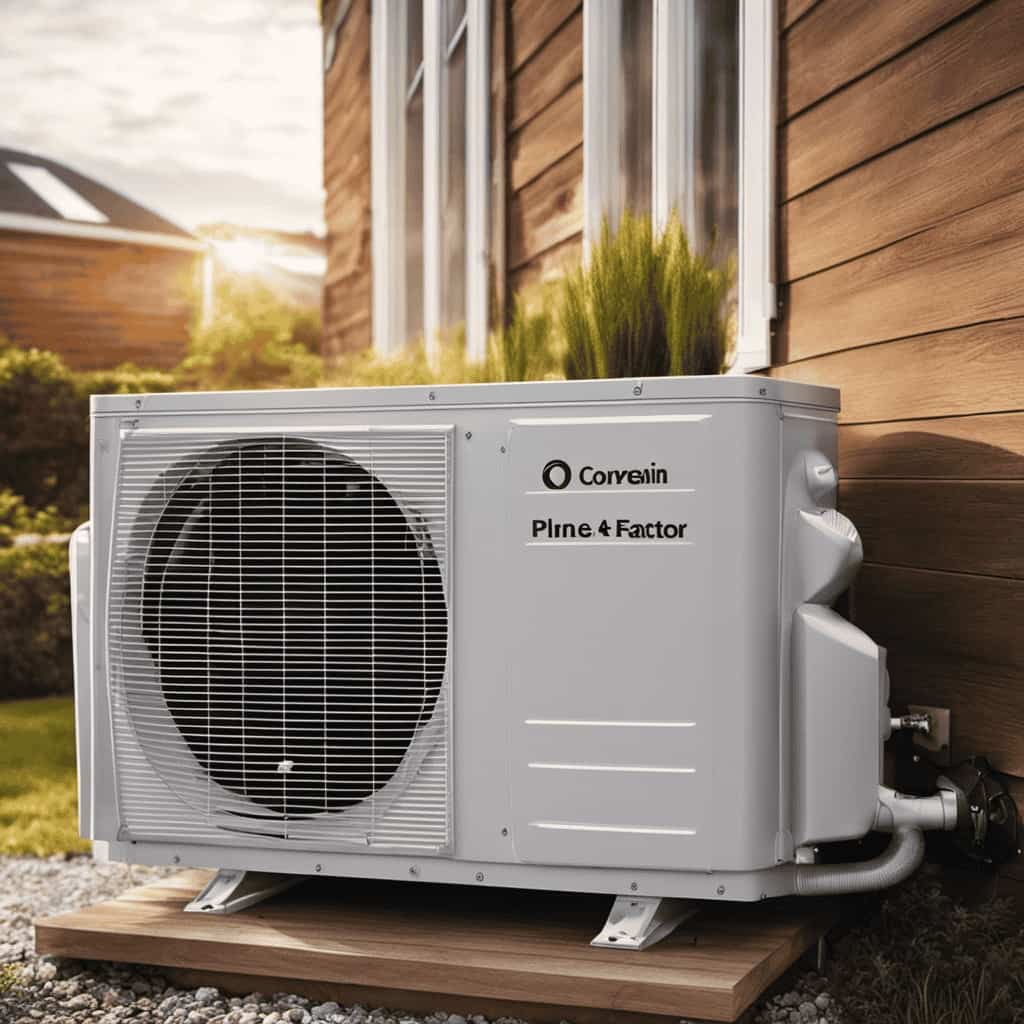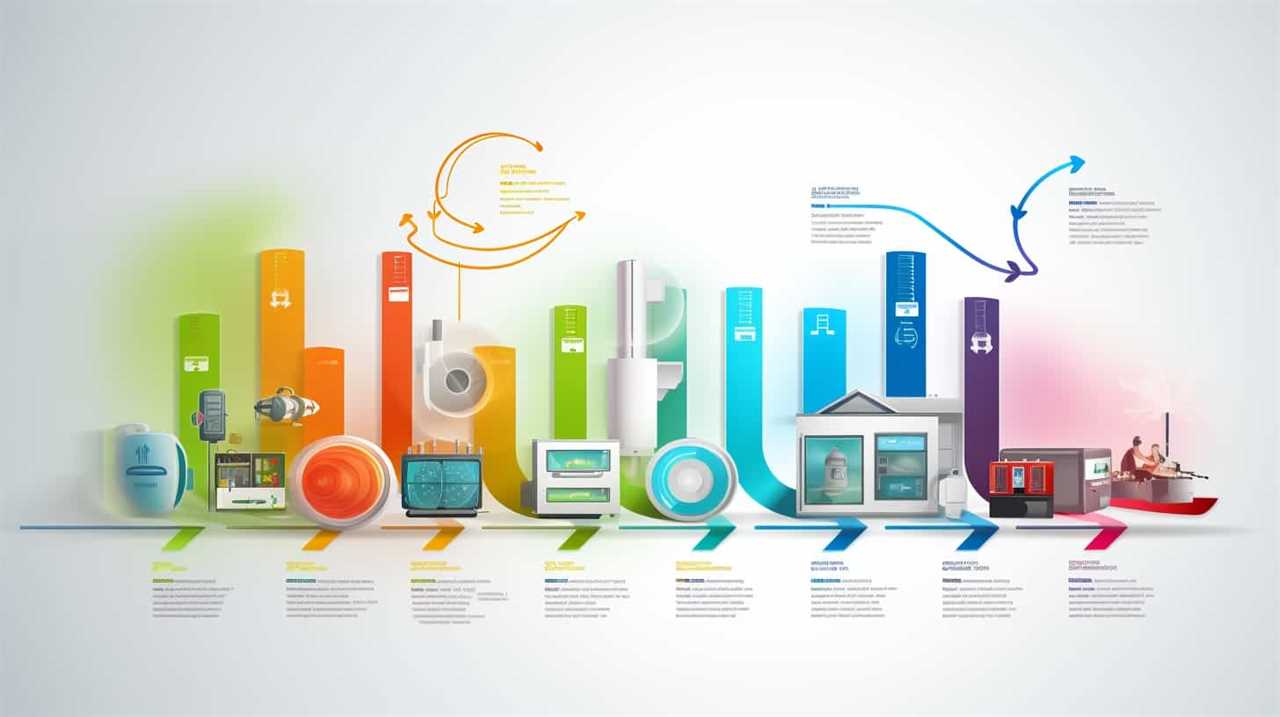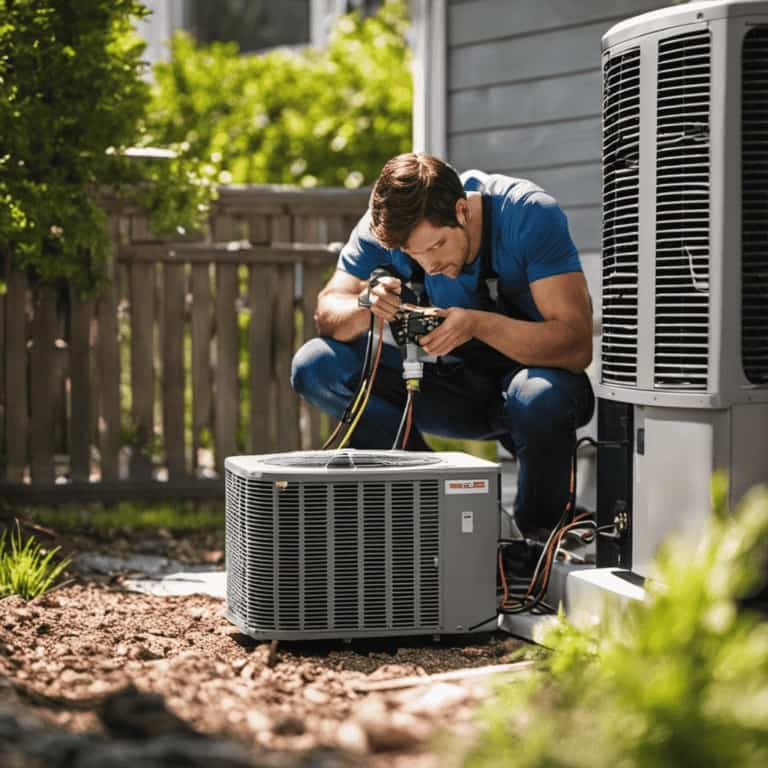Do you feel exhausted from paying high energy bills? We have the perfect solution for you.
Introducing the heat pump advantage. With heat pump technology, we can reduce our energy consumption and increase our savings.
In this article, we’ll explore how heat pumps work and provide you with energy-saving tips to optimize their performance.
Join us as we delve into the key role heat pumps play in sustainable energy solutions and discover how to maximize your energy savings with these efficient systems.

Key Takeaways
- Heat pumps provide a cost-effective way to heat and cool spaces, resulting in long-term savings on heating and cooling costs.
- Regular maintenance ensures optimal heat pump performance and increases energy efficiency.
- Proper insulation and sealing of doors and windows enhance heat pump performance and maximize energy savings.
- Using smart thermostat controls and programmable settings can further optimize energy savings and reduce energy consumption.
How Heat Pumps Can Reduce Energy Consumption
We can significantly reduce energy consumption by using heat pumps. Heat pump installation is a cost-effective energy reduction solution that offers numerous benefits for both homeowners and the environment.
By utilizing the principles of thermodynamics, heat pumps are able to extract heat from the air, ground, or water and transfer it to the desired location, such as a home or office space. This process is highly efficient, as it requires minimal energy input to generate a large amount of heat output.
Heat pumps not only provide a cost-effective way to heat and cool spaces, but they also contribute to environmental sustainability. They operate using renewable energy sources, such as the heat in the air or ground, instead of relying solely on fossil fuels. This reduces greenhouse gas emissions and helps combat climate change.
Harnessing the power of heat pump technology for energy efficiency is a promising step towards a more sustainable future.

Harnessing the Power of Heat Pump Technology for Energy Efficiency
By harnessing the power of heat pump technology, we can achieve significant energy efficiency and reduce our environmental impact. Heat pump technology offers numerous benefits in residential settings, making it an ideal choice for homeowners looking to save energy and reduce their carbon footprint.
Here are five key advantages of heat pump technology:
-
Efficient heating and cooling: Heat pumps can both heat and cool your home, providing year-round comfort with lower energy consumption compared to traditional HVAC systems.
-
Environmental friendliness: Heat pumps use renewable energy sources, such as air or ground, to transfer heat, reducing reliance on fossil fuels and minimizing greenhouse gas emissions.

-
Cost savings: Heat pumps are highly efficient, resulting in lower energy bills and long-term savings on heating and cooling costs.
-
Versatility: Heat pumps can be used in various settings, including residential homes, commercial buildings, and even swimming pools.
-
Easy installation process: Installing a heat pump is relatively straightforward, and with professional assistance, homeowners can quickly reap the benefits of this energy-efficient technology.
Energy-Saving Tips: Optimizing Heat Pump Performance
How can we optimize the performance of our heat pump to save energy?

Proper maintenance is crucial for ensuring heat pump efficiency. Regularly cleaning or replacing air filters can prevent airflow restrictions, allowing the heat pump to operate more efficiently. Additionally, scheduling professional maintenance at least once a year can help identify and address any performance issues before they become major problems.
Another energy-saving tip is to adjust the thermostat settings for heat pumps. Setting the temperature a few degrees lower in the winter and a few degrees higher in the summer can significantly reduce energy consumption.
The Key Role of Heat Pumps in Sustainable Energy Solutions
One of the key roles of heat pumps is their ability to provide sustainable energy solutions for our homes and businesses. Heat pump technology advancements have made them more efficient and environmentally friendly than ever before.
Here are five reasons why heat pumps play a crucial role in sustainable energy solutions:

-
Energy Efficiency: Heat pumps use renewable energy sources, such as the air, ground, or water, to transfer heat rather than generating it. This results in significant energy savings compared to traditional heating and cooling systems.
-
Reduced Carbon Emissions: By utilizing renewable energy sources, heat pumps produce fewer greenhouse gas emissions, helping to combat climate change.
-
Versatility: Heat pumps can be used for both heating and cooling purposes, making them a versatile solution for year-round comfort.
-
Long Lifespan: Heat pumps are built to last, with an average lifespan of 15-20 years, reducing the need for frequent replacements and minimizing waste.

-
Financial Savings: Heat pumps can help lower energy bills by reducing the amount of electricity or fuel needed for heating and cooling.
With these environmental benefits and technological advancements, heat pumps are a significant component of sustainable energy solutions.
Maximizing Energy Savings With Heat Pump Systems
We can maximize energy savings with heat pump systems by implementing smart thermostat controls and regular maintenance. Smart thermostats allow us to program temperature settings based on occupancy patterns, which helps to reduce energy consumption and lower utility bills. By setting the thermostat to a slightly higher temperature in the summer and lower temperature in the winter when no one is home, we can avoid unnecessary energy usage. Regular maintenance is also crucial for ensuring optimal performance and energy efficiency of heat pump systems. This includes cleaning or replacing air filters, checking refrigerant levels, and inspecting the outdoor unit for any obstructions. A well-maintained heat pump system can operate more efficiently, resulting in lower energy costs and a longer lifespan.
| Benefits of Smart Thermostat Controls | Benefits of Regular Maintenance |
|---|---|
| Reduces energy consumption | Ensures optimal performance |
| Lowers utility bills | Increases energy efficiency |
| Customizable temperature settings | Extends the lifespan |
| Avoids unnecessary energy usage | Prevents costly repairs |
| Improves comfort and convenience | Enhances indoor air quality |
Frequently Asked Questions
Are Heat Pumps Suitable for All Types of Climates?
Yes, heat pumps are suitable for all types of climates. They offer high efficiency and can effectively cool or heat a space. The installation process is straightforward and can provide long-term energy savings.

How Do Heat Pumps Compare to Traditional Heating and Cooling Systems in Terms of Energy Efficiency?
Heat pumps are more energy-efficient than traditional heating and cooling systems. They have pros and cons for energy savings. However, a thorough comparison of their energy efficiency is necessary to understand their advantages.
Can Heat Pumps Be Used to Provide Hot Water for Domestic Use?
Yes, heat pumps can be used to provide hot water for domestic use. They are an energy-efficient option that can save money on utility bills. However, the installation cost of heat pumps should be considered.
What Are the Maintenance Requirements for Heat Pump Systems?
Heat pump maintenance is crucial to ensure optimal performance. Regular filter cleaning, checking refrigerant levels, and inspecting electrical connections are common tasks. Addressing issues promptly can prevent costly repairs and extend the lifespan of the system.
Are There Any Government Incentives or Tax Credits Available for Installing Heat Pump Systems?
Yes, there are government incentives and tax credits available for installing heat pump systems. These financial benefits are designed to promote energy efficiency and encourage homeowners to make environmentally-friendly choices for their heating and cooling needs.

Conclusion
In conclusion, while heat pumps may seem like a small addition to your home, their energy-saving capabilities are truly remarkable.
It’s ironic how such a simple technology can have such a significant impact on reducing energy consumption.
By harnessing the power of heat pump technology and optimizing its performance, we can’t only save money on our energy bills but also contribute to a more sustainable future.
So why not embrace the heat pump advantage and make a positive change for our planet?










